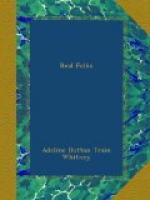It was a stump when her father died, and her mother had to manage the farm, and she to help her. The mortgage they had to work off was a stump; but faith and Luclarion’s dairy did it. It was a stump when Marcus wanted to go to college, and they undertook that, after the mortgage. It was a stump when Adam Burge wanted her to marry him, and go and live in the long red cottage at Side Hill, and she could not go till they had got through with helping Marcus. It was a terrible stump when Adam Burge married Persis Cone instead, and she had to live on and bear it. It was a stump when her mother died, and the farm was sold.
Marcus married; he never knew; he had a belles-lettres professorship in a new college up in D——. He would not take a cent of the farm money; he had had his share long ago; the four thousand dollars were invested for Luke. He did the best he could, and all he knew; but human creatures can never pay each other back. Only God can do that, either way.
Luclarion did not stay in ——. There were too few there now, and too many. She came down to Boston. Her two hundred and eighty dollars a year was very good, as far as it went, but it would not keep her idle; neither did she wish to live idle. She learned dress-making; she had taste and knack; she was doing well; she enjoyed going about from house to house for her days’ work, and then coming back to her snug room at night, and her cup of tea and her book.
Then it turned out that so much sewing was not good for her; her health was threatened; she had been used to farm work and “all out-doors.” It was a “stump” again. That was all she called it; she did not talk piously about a “cross.” What difference did it make? There is another word, also, for “cross” in Hebrew.
Luclarion came at last to live with Mrs. Edward Shiere. And in that household, at eight and twenty, we have just found her.
III.
BY STORY-RAIL: TWENTY-SIX YEARS AN HOUR.
Laura Shiere did not think much about the “stump,” when, in her dark gray merino travelling dress, and her black ribbons, nicely appointed, as Mrs. Oferr’s niece should be, down to her black kid gloves and broad-hemmed pocket-handkerchief, and little black straw travelling-basket (for morocco bags were not yet in those days), she stepped into the train with her aunt at the Providence Station, on her way to Stonington and New York.
The world seemed easily laid out before her. She was like a cousin in a story-book, going to arrive presently at a new home, and begin a new life, in which she would be very interesting to herself and to those about her. She felt rather important, too, with her money independence—there being really “property” of hers to be spoken of as she had heard it of late. She had her mother’s diamond ring on her third finger, and was comfortably conscious of it when she drew off her left-hand glove. Laura Shiere’s nature had only been stirred, as yet, a very little below the surface, and the surface rippled pleasantly in the sunlight that was breaking forth from the brief clouds.




